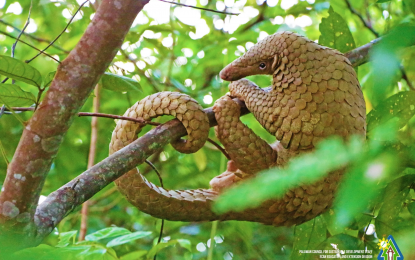
NEEDS PROTECTION. A wild Pangolin photographed in its natural habitat in the forests of Palawan. On Monday (July 31, 2023), the Palawan Council for Sustainable Development (PCSD) expressed alarm over the apparent resurgence in the poaching of this rare animal. (Photo courtesy of PCSD)
PUERTO PRINCESA, Palawan – The Palawan Council for Sustainable Development (PCSD) on Monday expressed alarm over the apparent resurgence in the poaching of endangered species after wildlife rangers seized a large number of pangolin scales from suspected animal traffickers.
In an interview, PCSD spokesperson Jovic Fabello said the most recent incident represents the second significant seizure of Pangolin scales this year, which indicates that the black market for exotic fauna is again active.
He disclosed that last July 27, five suspected poachers were arrested in the town of Taytay with 27 kilos of pangolin scales.
“The latest case was particularly alarming because of the quantity—27 kilos were confiscated. Imagine, you need about 10 pangolins to gather one kilo of scales. That constitutes so many pangolins killed. They (poachers) will really drive the pangolin population to extinction,” Fabello said in Tagalog.
He recounted that in February, two individuals were apprehended in a buy-bust operation in Sitio Bokbok, Brarangay Bebeladan, El Nido town while attempting to sell pangolin scales.
Fabello said that intelligence reports revealed that pangolin scales and meat are shipped to Chinatown in Manila and from there, some are exported while some are used for traditional medicine or consumed as “bush meat.”
He lamented that Taytay has become the new hotspot for pangolin poaching because the animal’s population in other parts of Palawan may have already been depleted.
Fabello noted that the PCSD has asked the Zoological Society of London (ZSL) to survey how many pangolins remain in the forests of Northern Palawan.
“We thought that the illegal trade of pangolins has declined due to the many restrictions. During the pandemic, travel restrictions certainly caused a decline in wildlife trafficking. But with the normalization of travel, we are seeing a resurgence,” he said.
Fabello revealed that in response to the latest seizure of scales, authorities are intensifying their efforts to combat illegal pangolin trafficking.
The intensified effort includes increasing patrols and enhancing monitoring activities to better protect the pangolin population in the region, he added.
Pangolins are mammals known for their unique appearance, distinguished by tough, overlapping scales covering their bodies. They are natural pest controllers, being insectivores, and they play an important role in regulating insect populations, particularly ants and termites.
Pangolins have become the most trafficked animal globally, largely driven by the high demand for traditional medicine and as a “extravagant food” in certain cultures, said Fabello. (PNA)
